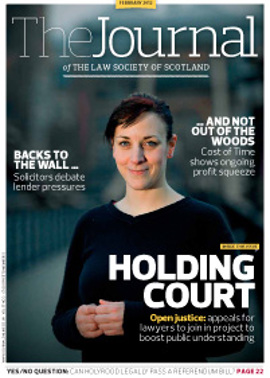The best of times, the worst of times

"It was the best of times, it was the worst of times, it was the age of wisdom, it was the age of foolishness, it was the epoch of belief, it was the epoch of incredulity, it was the season of Light, it was the season of Darkness, it was the spring of hope, it was the winter of despair, we had everything before us, we had nothing before us, we were all going direct to Heaven, we were all going direct the other way – in short, the period was so far like the present period, that some of its noisiest authorities insisted on its being received, for good or for evil, in the superlative degree of comparison only." (Charles Dickens, A Tale of Two Cities)
The Society of Local Authority Lawyers and Administrators in Scotland (SOLAR) AGM and conference this year will be held at Keavil House Hotel, near Dunfermline, on 15 and 16 March. As SOLAR President this year, one of my rare instances of making an executive decision without consultation was to give the conference a name, in the interests of getting the flyer out. Why then did I decide to use the opening lines of a 19th century novel to describe the current state of local government legal practice?
The image of a Dickensian clerk scribbling away with a quill pen wasn’t what I had in mind. In fact, I would argue that, by dint of its sheer diversity, the local government legal landscape is subject to a much faster pace of change than many areas of private practice.
This is not just because the type of things that local government is responsible for – social work, education, housing, to name just three – affect people’s everyday lives and are therefore subject to constant tinkering by the policy makers. It is also because those affected are increasingly looking to assert their rights through the courts.
Top of the agenda
Some of this change has been accelerated by the effects of the recession on local government. Although councils were shielded initially from the economic downturn because of the way they are funded, the cuts have started to bite throughout the UK, and difficult budgetary decisions have led to increasing levels of legal challenge.
Take, for example, the area of equalities, one of the topics covered at this year’s conference. In a string of cases which included W v Birmingham City Council [2011] EWHC 1147 (Admin), the court held that councils, like other public bodies, must carry out equalities impact assessments where appropriate, when seeking to cut services or alter the way they are delivered. This means that hard budget decisions can only be made by councils after a full appraisal of how they will affect minority groups, and what mitigating factors can be put in place to counteract those effects. Given that the consequences of budget decisions are often very difficult to anticipate, this has been fertile ground for a fast-paced area of case law.
Another topic covered at this year’s conference, and one which is becoming a hardy perennial, is that of procurement. It is an example of an area where the overall policy imperative – giving all businesses, in this case EU-wide, a chance to tender for local authority contracts – has led to numerous regulations from all tiers of governmental authority as well as a skein of case law across Europe of which local government lawyers need to be aware.
A third evolving area is the Scottish Government’s drive to ensure that councils share their services. The need to drive out savings is leading to new ways of delivering those services jointly, with the inevitable issues concerning governance. Should the partnering councils set up a joint venture company, a limited liability partnership (LLP) or a Scottish charitable incorporated organisation (SCIO)? Again, this year’s conference looks at these issues with the benefit of experienced practitioners, both those from within local government, and advisers in external firms.
In the meantime, none of the more conventional areas of legal practice for the local government lawyer stands still. The big four supermarkets continue to rewrite our jurisprudence on planning and administrative law in the courts. There are plans afoot to reform police and fire authorities. At some point there will be an independence referendum to administer. Before that, there are new regulations to be read through for the local government election in May. After the election, there will be meetings in smoke-free rooms with new administrations anxious to discuss how, legally, the new council is to be set up.
Shaping the future
I suppose there are two ways of looking at all this new legislation and case law. One way is to consider this the worst of times to be a council solicitor. It is certainly true that the days of being able to bump along as a generalist in local government are long gone. The bigger councils, especially, are increasingly devoting resources to specialisms, either by developing their own staff in that direction or using external firms. This can lead to the benefits and disbenefits of any niche practice for individual lawyers.
On the other hand, a challenging environment can be an exciting one. Moreover, and this is not a political point, the advent of the Scottish Parliament has put local government lawyers much closer to the ear of policy makers than ever before. Some of this is indirect: the minister at Holyrood considering new legislation is only a phone call away from a senior local government politician in Stirling or Renfrew, for example. However, SOLAR is an influencing organisation in its own right. Some of the pressure for action in the area of compulsory purchase, for example, has come from SOLAR members, who have also been asked to provide evidence for Holyrood committees considering new legislation, on matters such as conveyancing and common good.
This year, we have taken things one step further by linking directly with the Scottish Government Legal Directorate (SGLD) to discuss issues of common interest. A joint conference in November on matters such as equalities was a success. SGLD lawyers now regularly attend SOLAR meetings, increasing understanding between the two levels of government. We hope that this input will be helpful to the Scottish Government’s lawyers when, for example, regulations which affect the daily practice of local government law come to be drafted and consulted on, even if our respective policy objectives may in the end be different from each other.
At the time of writing, SOLAR is entering into initial consultations on a proposed new Community Empowerment Bill. While the current Holyrood administration’s take on localism is likely to be different from the UK Government legislation down south, there is no doubt that changing the ways in which communities can influence local services will be an area of interest for councils and their legal advisers.
On the upside
The best of times or the worst of times? As the rest of the novel’s opening paragraph suggests, it is probably both, depending on your point of view. However, SOLAR now organises nine special interest working groups covering the full range of local government legal practice. Its website is about to undergo a major overhaul to provide a complete suite of resources for its members.
There are increasing amounts of development opportunities, both at this year’s conference and in other forthcoming events.
Whatever we make of the current times, the local government lawyer has never been better equipped to deal with the accelerating pace of change.
In this issue
- Credit hire: a tug of war?
- As others see them
- Taking care of the dead
- Act like a trustee, think like a fund manager
- Beating the stress bug
- Reading for pleasure
- John McNeil, CBE, WS: an appreciation
- Opinion column: Open Justice
- Council profile
- Book reviews
- President's column
- On the move
- Between a rock and a hard place
- Tough times are still ahead
- Care: a new direction
- Officer class
- Open questions
- Fuller benches
- The limits of hearsay
- If you don't ask, you don't get?
- Fees: not so simple?
- Easing the debt block
- Registering our concerns
- Room at the top
- The best of times, the worst of times
- Law reform roundup
- Work and Cancer: employers’ toolkit
- From the Brussels office
- Post with caution
- Ask Ash
- The learning curve
- Business checklist
- Hear us, we say






